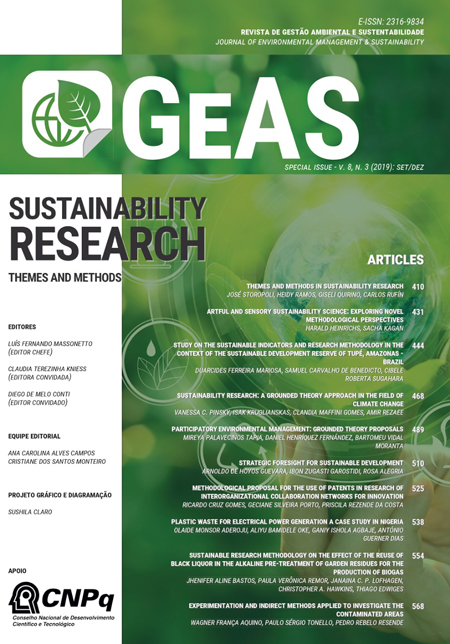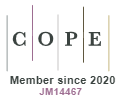PLASTIC WASTE FOR ELECTRICAL POWER GENERATION A CASE STUDY IN NIGERIA
DOI:
https://doi.org/10.5585/geas.v8i3.15778Palavras-chave:
Incineração, Resíduos sólidos urbanos, Resíduos para a produção de energia, Resíduos plásticos, Potencial de geração elétrica.Resumo
Um dos grandes problemas da Nigéria, na atualidade, é a grande quantidade de resíduos plásticos que são produzidos nas suas principais cidades. Os resíduos plásticos têm sido uma ameaça para os arredores daquelas cidades (em particular sobre o solo e sobre a água) e contribuem para desastres de inundação e outros eventos de degradação ambiental que conduzem a sérios riscos para a saúde humana. Assim, este estudo tem como objetivo avaliar o potencial dos resíduos plásticos produzidos na Nigéria para a geração de energia elétrica. O estudo desenvolvido baseia-se em duas estratégias (uma abordagem baseada em incentivos e no princípio da Responsabilidade Estendida do Produtor (REP)) para a coleta de resíduos plásticos no meio ambiente. O foco deste trabalho está na incineração de resíduos plásticos com recuperação da energia produzida. Assim, foram realizadas análises imediata e elementar para determinar o Poder Calorífico Superior (PCS) e o Poder Calorífico Inferior (PCI), bem como estimar o Potencial de Geração de Energia (PGE). Os resultados empíricos mostram que o PCS foi avaliado em 568.96 kcal/kg e o PCI foi avaliado em 561.55 kcal/kg. Adicionalmente, foi determinado o Potencial de Geração de Energia (PGE) usando 100 toneladas de resíduos plásticos e 4.83 milhões de toneladas (81% de plásticos manuseados inadequadamente) obtendo-se, respetivamente, 0.6 MW e 29.0 MW. Este estudo contribui para a literatura como uma visão geral de gestão de resíduos na Nigéria, focando-se nos problemas relacionados com os resíduos plásticos. Além disso, o conceito proporciona uma solução sustentável para esta tipologia de resíduos que afeta particularmente a envolvente das grandes cidades. Além disso, é provável que seja uma solução sustentável para a acumulação de resíduos plásticos no meio ambiente e uma solução suplementar para a produção de energia elétrica.
Os resultados mostram que a quantidade de resíduos plásticos produzidos na Nigéria, provavelmente, gerará eletricidade suficiente para complementar as fontes tradicionais de produção de eletricidade.
Downloads
Referências
Abdulkarim I.A & Abiodun A.O (2012). A study of problems associated generation and disposal in Kano Metropolis. Academic Research International, Vol. 3, No. 2, pp 56-65.
Adebayo C (2014). “How is 100% Renewable Energy Possible for Nigeria?” Global Energy Network Institute (GENI). Retrieved from geni.org/global energy; Accessed on the 25/04/19.
Adebola O.O (2006). The Role of Informal Private Sector in Integrated Solid Waste Management (ISWM) in Lagos, Nigeria - A Developing Country. Proceeding of the 21st International Conference on Solid Waste Technology & Management. Philadelphia P.A, March 26th – 29th.
Aderoju O.M, Guerner Dias A. & Anwasia B (2016). Ancestral Heritage of Flood plain Residence and Solid Waste Disposal Pattern in Flood Events in Kogi State, Nigeria, Conference Proceedings of the 3rd International Conference on Environmental and Economic Impact on Sustainable Development; in Valencia, Spain; June 8th – 10th. Ecology and The Environment, Vol 203, p 37-48, WIT Press, ISSN 1743-3541 (on-line).
Aderoju O.M & Guerner Dias A. (2018). Waste to energy as a complementary energy source in Abuja, Nigeria. WASTES: Solutions, Treatments and Opportunities, Published by Taylors and Francis Group, London, pp 63-68, ISBN 978-1-138-19669-8.
Aderoju O.M, Guerner Dias A., Ekweozoh P.C & Offiong I (2019). A Sustainable approach for Post-consumer PET bottles Recovery and Reduction in Nigeria. Proceedings of the 34th International Conference on Solid Waste Technology and Management, Annapolis, MD, USA; March 31st – April 3rd. Widerner University Press, USA.
Aderoju O.M, Guerner Dias A. & Guimaraes R (2015). Building Capacity an Integrated Perception and Attitude towards Municipal Solid Waste Management in Nigeria. WASTES: Solutions, Treatments and Opportunities, Published by Taylors and Francis Group, London, pp 7-12, ISBN 978-1-138-02882-1.
Alamgir M, Donald C. Mc, Roehi K. E and Ahsan A. (2005). Integrated management and safe disposal of MSW in least developed Asian countries-A feasibility study, Waste Safe. Khulna University of Engineering and Technology, Asia Pro Eco-Programme of the European Commission.
Amoo, O.M & Fagbenle, R.L (2013). Renewable Municipal Solid Waste pathways for Energy Generation and Sustainable Development in the Nigerian context. International Journal of Energy and Environmental Engineering, 4/42.
ASTM D 5231-92 (Reapproved 2016). Standard Test Methods for Determination of the Composition of Unprocessed Municipal Waste; ASTM International, 6p, 2016. Available online at: http://www.astm.org/standards/D5231.
Babayemi J.O & Dauda K.T (2009). Evaluation of Solid Waste Generation, Categories and Disposal options in Developing Countries: A case study of Nigeria. J. Appl. Sci. Environ. Management 13(3): 83–88.
Daily Trust (2016). Abuja Environmental Planning Board (AEPB) Plans Integrated Solid Waste Management (ISWM). Retrieved online; https://www.pressreader.com. Accessed on 20/ 03/2019.
DEFRA (2013). Incineration of Municipal Solid Waste; Department for Environment, Food and Rural Affairs. February 2013.www.defra.gov.uk
Franjo C.F, Ledo J.P, Rodriguez A. J.S and Nunez L (1992). Calorific Value of Municipal Solid Waste. Environmental Technology, 13: 11, 1085-1089. DOI: 10, 1080/09593339209385246.
Friends of the Environment (2018). Plastic Wastes von Water. https://fote.org.ng/2018/03/well-phase-plastic-bottles-2023-lagos-government/plastic-wastes-on-water/. Accessed on 26/04/2019.
Geyer R, Jambeck J. R & Law, K. L (2017). Production, use, and fate of all plastics ever made. Science Advances, 3(7), e1700782. Available at: http://advances.sciencemag.org/content/3/7/e1700782.
He C, Giannis A & Wang J (2013). Conversion of Sewage sludge to Clean Solid fuel using hydrothermal Carbonzation; Hydrochar fuel Characteristics and Combustion Behavior; Application Energy 2013; 111:257 0 266.
How to Start Waste Management Business in Nigeria (2018). Retrieved online from; https://infoguidenigeria.com/waste-management-business-nigeria/. Accessed on 15/05/2019.
Huang N. (2012). Industry Insight: Global Plastics Industry. Retrieved online: http://www.businessvibes.com/blog/industry-insight-global-plastics-industry.
Idowu O, Omirin M, & Osagie J. (2011). Outsourcing for Sustainable Waste Disposal in Lagos Metropolis: Case study of Agege Local Government, Lagos. Journal of Sustainable Development, 4(6), 116-131.
IEA (2007). Biomass for Power Generation and CHP. IEA Energy Technology Essential, 2007, ETE03, pp 1–4.
Imam A, Mohammed B, Wilson D.C & Cheeseman R. (2008). Solid waste management in Abuja, Nigeria. Waste Management, 28: 468-472.
Jambeck J. R, Geyer R, Wilcox C, Siegler T. R, Perryman M, Andrady A, Narayan R, & Law K. L. (2015). Plastic waste inputs from land into the ocean. Science, 347(6223), 768-771. Available at: http://science.sciencemag.org/content/347/6223/768. Accessed on 20/04/2019.
Johannessen LM & Boyer G (1999). Observations of Solid Waste Landfills in Developing Countries: Africa. Urban Development Division, Waste Anchor Team, the World Bank. Pp 10-12.
Kokalj F & Samec N (2013). Municipal Solid Waste for Power Production. Advances in Internal Combustion Engines and Fuel Technologies. DOI: 10.5772/55497.
Korobitsyn M.A, Jellema P & Hirs G.G (1999). Possibilities for Gas Turbine and Waste Incineration Integration, Energy 24(9): 783-793. DOI: 10.1016/SO360-5442(99)00034-1.
Kuleape R, Cobbinah S.J, Dampare S.B, Duwiejuah A.B, Amoako E.E, & Asare W (2014). Assessment of Energy recovery potential of solid waste generated in Akosombo, Ghana, African. Environmental. Science & Technology, 8 (5), 297–308. DOI: 10.5897/AJEST2014.1663.
Kumar J.S, Subbaiah K.V & Prasada Rao P.V.V (2010). Waste to Energy – A Case Study of Eluru City, Andhra Pradesh, India; International Journal of Environmental Science; Vol 1, No 2, pp 151 – 162.
Lauber J.D (2005). The Burning Issues of Municipal Solid Waste Disposal; What Works and What Doesn’t; Invited Presentation at The Toronto City Council Municipal Solid Waste Conference: Advances in process and programs; 12th may.
Minghua Z, Xiumin F, Rovetta A, Qichang H, Vicentini F, Bingkai L, Giusti A & Yi L (2009). Municipal solid waste management in Pudong New Area, China. Waste Manage 29:1227–1233.Modern Engineering Research, Vol. 2 No. 5, pp. 3669-3672.
Nabegu, A.B (2009). Municipal Solid Waste Management in Kano and Katsina cities: A comparative Analysis. Journal of Geography and Development 2(2): 97–209.
Nabegu, A.B. (2011). Solid Waste and Its Implications for Climate Change in Nigeria. Journal for human Ecology 34(2): 67–73.
Nnaji C.C (2015). "Status of municipal solid waste generation and disposal in Nigeria", Management of Environmental Quality: An International Journal, Vol. 26 Issue 1 pp. 53 – 71.
Nordi G.H, Palacios-Bereche R, Gallego A.G & Nebra S.A (2017). Electricity production from Municipal Solid Waste in Brazil. Waste Management & Research, pp 1-12. DOI: 10.1177/07342X17705721.
Nwambuonwo O. J. & M Mughele E. S. (2012). Using geographic information system to select suitable landfill sites for megacities (Case Study of Lagos, Nigeria). Computing, Information Systems & Development Informatics, 3(4), 48–56.
Ogbonna D, Ekweozor K & Ig E (2002). Waste management: a tool for environmental protection in Nigeria. Journal of Environmental Science 3(1): 55–57.
Ogwueleka T.C (2003). Planning Model for Refuse Management. Journal of Science and Technology 3(2): 71–76.
Ogwueleka T.C. (2009). Municipal Solid Waste Characteristics and Management in Nigeria. Iranian Journal of Environmental Health Science & Engineering 6(3): 173–180.
Oucho J (1986). Population Studies and Research Institute, Our Common Future. Report of the World Commission on Environment, Public Hearing, Nairobi, 23 Sept. 1986 A/42/427.
Oumarou M, Dauda M, Abdulrahim A & Abubakar A (2012). Characterization and generation of municipal solid waste in north central Nigeria, International Journal of Modern Engineering Research Vol.2, Issue.5, Sep-Oct. 2012 pp-3669-3672. ISSN: 2249-6645.
Prasada Rao P.V, Venkata K.S &Sudhir J.K (2010). Waste to energy: A case study of Eluru, A.P, India. International Journal of Environmental Science and Development, 1(2): 151–162.
Punch Newspaper (2018): Plastic Pollution; Nigeria’s Untapped Waste Wealth Fuel Environmental Disaster. Retrieved online; http://www.punchng.com. Accessed on 7/9/ 2018.
Revel M, Châtel A, & Mouneyrac C. (2018). Micro (nano) plastics: A threat to human health? Current Opinion in Environmental Science & Health, 1, 17-23. Retrieved online: https://www.sciencedirect.com/science/article/pii/S2468584417300235. Accessed on 19/05/ 2019.
Ritchie H & Roser M (2018). Plastic Pollution. Retrieved online; https://ourworldindata.org/plastic-pollution. Accessed on 9/05/2019.
Rousta K & Dahlén L (2015). Source separation of household waste; technology and social aspects. In: Taherzadeh M.J and Richards T (eds) Resource Recovery to Approach Zero Municipal Waste. Boca Raton: CRC Press, pp.61–77.
Sahara Reporters (2018), Visionscape, Ambode’s New Waste management Company Struggles to keep Lagos Clean. Retrieved online; https://www.saharareporters.com. Accessed on 12/04/2019.
Scavengers seek Conducive Environment to do Business (2018). Retrieved online; https:// www.environewsnigeria.com/scavengers-seek-conducive-environment-to-do-business/. Accessed on 21/04/2019.
Somsak S (2014). Separation of PVC from PET/PVC mixtures using floatation by calcium Lignosulfonate Depressant. Engineering Journal, Vol. 18, issue 1, pp 45-53. ISSN 0125-8281, Doi: 8.4186/ej.2014.18.1.45
Suberu M.Y, Mokhtar A.S, & Bashir N (2012). Renewable Power Generation Opportunity from Municipal Solid Waste: A Case Study of Lagos Metropolis (Nigeria). Journal of Energy Technologies and Policy: Vol. 2, No.2, 2012.
Tchobanoglous G, & Kreith F (2002). Handbook of Solid Waste Management, 2nd ed. New York: McGraw-Hill.
Tchobanoglous G, Theisen H, & Vigil S.A (1993). Integrated solid waste management: engineering principles and management issues. McGraw-Hill Inc., New York.
The Guardian (2018). The ban on Scavengers in FCT, Nigeria. Retrieved online; https:// guardian.ng/opinion/the-ban-on-scavengers-in-the-fct/. Accessed on 11/05/2019.
The Nation (2019). “Youths will be trained to convert waste to wealth”. Retrieved online; https:// thenationonlineng.net/waste to wealth/. Accessed on 1/06/2019.
Tsunatu D.Y, Tickson T.S, San K.D, & Namo J.M (2015). Municipal Solid Waste as Alternative Source of Energy Generation: A Case Study of Jalingo Metropolis, Taraba State, Nigeria. International Journal of Engineering and Technology, Vol.5, No. 3, pp. 185-193. ISSN: 2049-3444.
UNEP (2005). Solid Waste Management (Vol. I). United Nations Environment Programme- International Environmental Technology Centre. CalRecovery, Inc.
UNU-WIDER (2010), “Solid wastes, poverty and the environment in developing country cities: challenges and opportunities”, Working Paper No. 2010/23, United Nations University, World Institute for Development Economics Research, Helsinki.
USEPA (2005). Report of the municipal solid waste in the United States:2005 Facts and Figures. 5–15.
USEPA (2005). Report of the Municipal Solid Waste in the United States: 2005 Facts and Figures. pp 5-15.
Voelker B M. (2000). Waste–to- Energy, Solution for solid Waste Problem of 21st Century. http//www/p2pays.org/ref/09/08624.pdf.14/03/08.
WEC (2013). “World Energy Resources; Waste to Energy,” Vol. 7b, pp 2 -11.
World Bank (2012). “Urban Development Series: What is Waste; a global review of Solid Waste Management,” No 15.
Xu W, Zhou C, Lan Y, Jin J & Cao A (2015). An incentive-based source separation model for sustainable municipal solid waste management in China. Waste Management Resources; 33(5):469-76. DOI: 10.1177/0734242X15574979.
Downloads
Publicado
Como Citar
Edição
Seção
Licença
Copyright (c) 2019 Revista de Gestão Ambiental e Sustentabilidade

Este trabalho está licenciado sob uma licença Creative Commons Attribution-NonCommercial-ShareAlike 4.0 International License.










